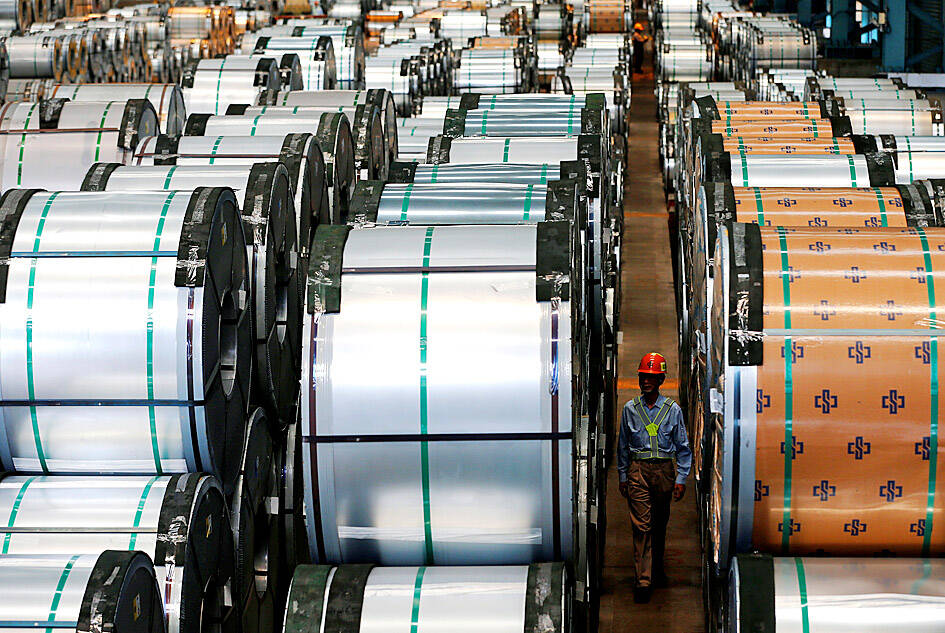China Steel Corp (CSC, 中鋼) yesterday said it would raise domestic steel prices by up to NT$1,200 (US$37.61) per tonne for delivery next month and next quarter, to reflect rising raw material costs and align with price hikes by regional peers.
The latest adjustments by nation’s largest steel maker follow a price increase of between NT$500 and NT$900 per tonne for delivery this month and a hike of NT$300 per tonne last month. Fubon Securities Investment Services Co (富邦投顧) had estimated an increase of between NT$500 and NT$1,000 per tonne.
“Asian currencies have been depreciating against the US dollar lately, and the New Taiwan dollar has even dropped by more than 4 percent in the past three months. This has pushed up the costs of raw materials for steel mills,” CSC said in a statement.

PHOTO: REUTERS
As major Asian steel mills have raised steel prices for delivery in the fourth quarter to reflect rising costs of iron ore and coking coal, the restocking demand is expected to emerge in the US and Europe by the end of the year, while consumption for steel used in vehicles continues to strengthen, CSC said.
It added that the global steel market is showing signs of an upward momentum.
The company said it would increase prices for major steel items — such as electrical sheets, hot-rolled steel plates and coils, cold-rolled steel coils, electro-galvanized and hot-dipped, zinc-galvanized steel coils — by NT$500 per tonne for delivery next month.
Price hikes are expected to be even bigger in the next quarter, ranging between NT$1,000 and NT$1,200 per tonne for steel rods, steel plates used in vessels and cold-rolled coils for steel buckets, while automobile steel would rise by NT$500 per tonne, it said.
The company’s price increases come as South Korea’s POSCO raised hot-rolled steel prices by US$38 per tonne for delivery next month, CSC said.
China’s Baowu Steel Group Ltd (寶武鋼鐵), Anshan Iron and Steel Group Corp (鞍山鋼鐵) and Benxi Iron and Steel Group Co (本溪鋼鐵) have also marked up their thin plate steel products by US$7 to US$14 per tonne for domestic shipments next month, it added.
Last week, CSC reported that consolidated revenue last month decreased 15.77 percent year-on-year to NT$30.55 billion, and cumulative revenue in the first eight months fell 24.3 percent to NT$245.47 billion.
The company yesterday said it was confident in its revenue outlook in light of a gradual recovery in the global economy, potential inventory replenishment by customers and an uptrend in global steel prices.
It added that the fourth quarter is historically a high season for the industry.

Taiwan Semiconductor Manufacturing Co (TSMC, 台積電) yesterday said that its investment plan in Arizona is going according to schedule, following a local media report claiming that the company is planning to break ground on its third wafer fab in the US in June. In a statement, TSMC said it does not comment on market speculation, but that its investments in Arizona are proceeding well. TSMC is investing more than US$65 billion in Arizona to build three advanced wafer fabs. The first one has started production using the 4-nanometer (nm) process, while the second one would start mass production using the

‘SILVER LINING’: Although the news caused TSMC to fall on the local market, an analyst said that as tariffs are not set to go into effect until April, there is still time for negotiations US President Donald Trump on Tuesday said that he would likely impose tariffs on semiconductor, automobile and pharmaceutical imports of about 25 percent, with an announcement coming as soon as April 2 in a move that would represent a dramatic widening of the US leader’s trade war. “I probably will tell you that on April 2, but it’ll be in the neighborhood of 25 percent,” Trump told reporters at his Mar-a-Lago club when asked about his plan for auto tariffs. Asked about similar levies on pharmaceutical drugs and semiconductors, the president said that “it’ll be 25 percent and higher, and it’ll

When an apartment comes up for rent in Germany’s big cities, hundreds of prospective tenants often queue down the street to view it, but the acute shortage of affordable housing is getting scant attention ahead of today’s snap general election. “Housing is one of the main problems for people, but nobody talks about it, nobody takes it seriously,” said Andreas Ibel, president of Build Europe, an association representing housing developers. Migration and the sluggish economy top the list of voters’ concerns, but analysts say housing policy fails to break through as returns on investment take time to register, making the

CHIP BOOM: Revenue for the semiconductor industry is set to reach US$1 trillion by 2032, opening up opportunities for the chip pacakging and testing company, it said ASE Technology Holding Co (日月光投控), the world’s largest provider of outsourced semiconductor assembly and test (OSAT) services, yesterday launched a new advanced manufacturing facility in Penang, Malaysia, aiming to meet growing demand for emerging technologies such as generative artificial intelligence (AI) applications. The US$300 million facility is a critical step in expanding ASE’s global footprint, offering an alternative for customers from the US, Europe, Japan, South Korea and China to assemble and test chips outside of Taiwan amid efforts to diversify supply chains. The plant, the company’s fifth in Malaysia, is part of a strategic expansion plan that would more than triple